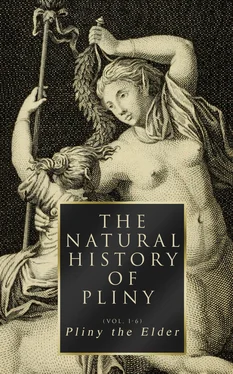Among these discordant opinions mankind have discovered for themselves a kind of intermediate deity, by which our scepticism concerning God is still increased. For all over the world, in all places, and at all times, Fortune is the only god whom every one invokes; she alone is spoken of, she alone is accused and is supposed to be guilty; she alone is in our thoughts, is praised and blamed, and is loaded with reproaches; wavering as she is, conceived by the generality of mankind to be blind, wandering, inconstant, uncertain, variable, and often favouring the unworthy. To her are referred all our losses and all our gains, and in casting up the accounts of mortals she alone balances the two pages of our sheet 126. We are so much in the power of chance, that chance itself is considered as a God, and the existence of God becomes doubtful.
But there are others who reject this principle and assign events to the influence of the stars 127, and to the laws of our nativity; they suppose that God, once for all, issues his decrees and never afterwards interferes. This opinion begins to gain ground, and both the learned and the unlearned vulgar are falling into it. Hence we have the admonitions of thunder, the warnings of oracles, the predictions of soothsayers, and things too trifling to be mentioned, as sneezing and stumbling with the feet reckoned among omens 128. The late Emperor Augustus 129relates, that he put the left shoe on the wrong foot, the day when he was near being assaulted by his soldiers 130. And such things as these so embarrass improvident mortals, that among all of them this alone is certain, that there is nothing certain, and that there is nothing more proud or more wretched than man. For other animals have no care but to provide for their subsistence, for which the spontaneous kindness of nature is all-sufficient; and this one circumstance renders their lot more especially preferable, that they never think about glory, or money, or ambition, and, above all, that they never reflect on death.
The belief, however, that on these points the Gods superintend human affairs is useful to us, as well as that the punishment of crimes, although sometimes tardy, from the Deity being occupied with such a mass of business, is never entirely remitted, and that the human race was not made the next in rank to himself, in order that they might be degraded like brutes. And indeed this constitutes the great comfort in this imperfect state of man, that even the Deity cannot do everything. For he cannot procure death for himself, even if he wished it, which, so numerous are the evils of life, has been granted to man as our chief good. Nor can he make mortals immortal, or recall to life those who are dead; nor can he effect, that he who has once lived shall not have lived, or that he who has enjoyed honours shall not have enjoyed them; nor has he any influence over past events but to cause them to be forgotten. And, if we illustrate the nature of our connexion with God by a less serious argument, he cannot make twice ten not to be twenty, and many other things of this kind. By these considerations the power of Nature is clearly proved, and is shown to be what we call God. It is not foreign to the subject to have digressed into these matters, familiar as they are to every one, from the continual discussions that take place respecting God 131.
CHAP. 6. (8.)—OF THE NATURE OF THE STARS; OF THE MOTION OF THE PLANETS.
Table of Contents
Let us return from this digression to the other parts of nature. The stars which are described as fixed in the heavens 132, are not, as the vulgar suppose, attached each of them to different individuals 133, the brighter to the rich, those that are less so to the poor, and the dim to the aged, shining according to the lot of the individual, and separately assigned to mortals; for they have neither come into existence, nor do they perish in connexion with particular persons, nor does a falling star indicate that any one is dead. We are not so closely connected with the heavens as that the shining of the stars is affected by our death 134. When they are supposed to shoot or fall 135, they throw out, by the force of their fire, as if from an excess of nutriment, the superabundance of the humour which they have absorbed, as we observe to take place from the oil in our lamps, when they are burning 136. The nature of the celestial bodies is eternal, being interwoven, as it were, with the world, and, by this union, rendering it solid; but they exert their most powerful influence on the earth. This, notwithstanding its subtilty, may be known by the clearness and the magnitude of the effect, as we shall point out in the proper place 137. The account of the circles of the heavens will be better understood when we come to speak of the earth, since they have all a reference to it; except what has been discovered respecting the Zodiac, which I shall now detail.
Anaximander the Milesian, in the 58th olympiad 138, is said to have been the first who understood its obliquity, and thus opened the road to a correct knowledge of the subject 139. Afterwards Cleostratus made the signs in it, first marking those of Aries and Sagittarius; Atlas had formed the sphere long before this time 140. But now, leaving the further consideration of this subject, we must treat of the bodies that are situated between the earth and the heavens 141.
It is certain that the star called Saturn is the highest, and therefore appears the smallest, that he passes through the largest circuit, and that he is at least thirty years in completing it 142. The course of all the planets, and among others of the Sun, and the Moon, is in the contrary direction to that of the heavens 143, that is towards the left, while the heavens are rapidly carried about to the right 144. And although, by the stars constantly revolving with immense velocity, they are raised up, and hurried on to the part where they set, yet they are all forced, by a motion of their own, in an opposite direction 145; and this is so ordered, lest the air, being always moved in the same direction, by the constant whirling of the heavens, should accumulate into one mass, whereas now it is divided and separated and beaten into small pieces, by the opposite motion of the different stars. Saturn is a star of a cold and rigid nature, while the orbit of Jupiter is much lower, and is carried round in twelve years 146. The next star, Mars, which some persons call Hercules 147, is of a fiery and burning nature, and from its nearness to the sun is carried round in little less than two years 148. In consequence of the excessive heat of this star and the rigidity of Saturn, Jupiter, which is interposed between the two, is tempered by both of them, and is thus rendered salutary. The path of the Sun consists of 360 degrees; but, in order that the shadow may return to the same point of the dial 149, we are obliged to add, in each year, five days and the fourth part of a day. On this account an intercalary day is given to every fifth year 150, that the period of the seasons may agree with that of the Sun.
Below the Sun 151revolves the great star called Venus, wandering with an alternate motion 152, and, even in its surnames, rivalling the Sun and the Moon. For when it precedes the day and rises in the morning, it receives the name of Lucifer, as if it were another sun, hastening on the day. On the contrary, when it shines in the west, it is named Vesper, as prolonging the light, and performing the office of the moon. Pythagoras, the Samian, was the first who discovered its nature 153, about the 62nd olympiad, in the 222nd year of the City 154. It excels all the other stars in size, and its brilliancy is so considerable, that it is the only star which produces a shadow by its rays. There has, consequently, been great interest made for its name; some have called it the star of Juno 155, others of Isis, and others of the Mother of the Gods. By its influence everything in the earth is generated. For, as it rises in either direction, it sprinkles everything with its genial dew, and not only matures the productions of the earth, but stimulates all living things 156. It completes the circuit of the zodiac in 348 days, never receding from the sun more than 46 degrees, according to Timæus 157.
Читать дальше












